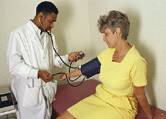- Cancer Takes Tough Toll on Family Finances
- You Might Fare Better If Your Doctor Is Female, Study Finds
- CDC Launches Online ‘Heat Forecaster’ Tool as Another Summer Looms
- Biden Administration Sets Nursing Home Staffing Minimums
- Neosporin Ointment in the Nose Might Be Potent Antibiotic
- Physical Ills Often Plague People With Schizophrenia, Bipolar
- Taking Psilocybin for Depression? Relationship With Therapist Is Key
- Stick to Heimlich Maneuver Not ‘Anti-Choking’ Devices, FDA Says
- Women in the Military at Risk for Low-Weight Babies
- Repeat Blasts Can Damage Soldiers’ Brains, Study Confirms
High Blood Pressure May Be Worse for Women


High blood pressure might be more dangerous for women than men, a new study suggests.
As a result, women may need earlier and more aggressive treatment for the condition, the study authors said.
“The medical community thought that high blood pressure was the same for both sexes, and treatment was based on that premise,” lead author Dr. Carlos Ferrario, a professor of surgery at Wake Forest Baptist Medical Center, said in a medical center news release. “This is the first study to consider sex as an element in the selection of [drugs to treat high blood pressure] or base the choice of a specific drug on the various factors accounting for the elevation in blood pressure.”
Although deaths due to heart disease have dropped dramatically among men over the past three decades, the same is not true for women, the researchers noted. On the contrary, heart disease is a leading cause of death among American women, according to the news release.
The new study was published in the December issue of Therapeutic Advances in Cardiovascular Disease.
The researchers conducted a series of specialized tests on 100 men and women aged 53 and older with untreated high blood pressure but no other medical conditions. Tests measured the forces involved in blood circulation as well as the hormones involved in blood pressure regulation. Their purpose was to determine if the heart or the blood vessels were primarily involved in participants’ high blood pressure.
Among women and men with the same level of high blood pressure, the women had 30 percent to 40 percent more vascular disease than the men, the study found. Significant physiologic differences were also found in the women’s cardiovascular system, including the types and levels of hormones that regulate blood pressure.
The researchers said these differences influence how aggressively the condition needs to be treated.
“We need to evaluate new protocols — what drugs, in what combination and in what dosage — to treat women with high blood pressure,” Ferrario said.
More information
The U.S. National Heart, Lung, and Blood Institute has more about high blood pressure.
Source: HealthDay
Copyright © 2024 HealthDay. All rights reserved.










